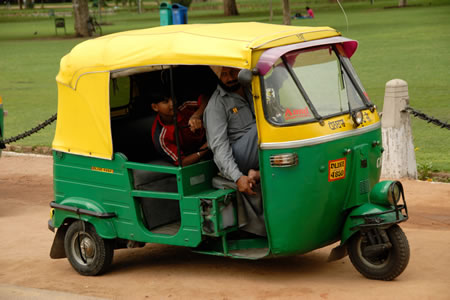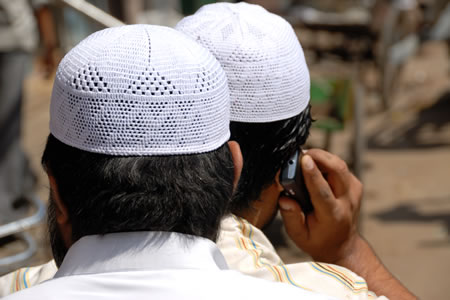

| Surviving Delhi | |
Jaipur (India), October 3rd 2007 |
|
Most visitors experience Delhi as a frustrating city. On the one side you see extreme poverty of some of the inhabitants and on the other side you are often the centre of attention while walking through the city. On top of that, you must be alert to avoid to get ripped of. A striking cartoon in an old Lonely Planet guidebook describes the image of Delhi by showing a traveller who is hiding under his hotel bed. For many people, Delhi is synonym the place where all downsides of India come together. So, we are warned when we travel to India’s capital. When we survive this, the remainder of India must be doable. A positive surprise awaits us when arriving at the airport of Delhi. One of our slogans is not applicable. We normally say ironically that the taxi driver is the first thief that you’ll see at an airport. The problem of overcharging taxi drivers is overcome by introducing a prepaid taxi system for taxies leaving the airport area. At the prepaid taxi booth you tell where you want to go and here you pay a fixed price for the ride. Afterwards you get a ticket which states where you want to go. Only at the moment when you arrive at the final destination you hand over the ticket to the taxi driver. With that ticket he can collect his fare from the prepaid taxi agency. Without any hassle, we are dropped off at the hotel of our choice. Until now, we have no reason to complain. |
|
 |
|
One of the rickshaw drivers that refuses to use the meter for foreigners |
|
This positive first impression only lasts for a short while. When you wander through the more touristy areas of Delhi, so called “touts” constantly try to get in contact with you. Touts are men that try to tempt you to go to certain shops, travel agencies or hotels where they get a commission based on the number of tourists that they bring in or the amount of money that those tourists spend. This commission can be as high as 30% of the amounts spend. Obviously this means that you have to pay through the nose when you are brought to a shop by a tout. The commission has to be paid in one way or the other. There are all kinds of touts, but 99.9% is male and tells you that he is a businessman. A tout realizes that he has to win the confidence of tourists first, before he can lead them to a certain shop. Therefore, he warns repeatedly that there are so many touts in the city. Of course he forgets to inform you that he is a tout himself. Most touts leave you alone when you tell them that you are not interested. The more tenacious tout walks several hundred metres with you before they leave you in peace. Some even call you a racist if you let them know that you want to walk on your own. It’s difficult to duck out of all touts, but to have least hassle you have to walk around the city like you know it blindly. So, never walk with a guidebook in you hand and foremost never look on a city map. Hence, these are the moments that you will certainly hear: “Hello Mister, are you looking for a shop?”. Delhi is blessed with a metro system. The metro is an excellent mean of transport to get from one place to the other. Unfortunately, the metro does not cover the entire city. When you want to reach a place that is not accessible by metro and if you don’t want to walk, you are mostly dependent on the auto-rickshaw or the cycle-rickshaw. If you are dealing with cycle-rickshaw drivers you have to negotiate the price on forehand. The price that a local pays is normally around 5 times lower than the asking price to a foreigner. So, bargaining is perfectly acceptable. You have to be very clear whether the price includes all passengers and baggage. Otherwise, you can have some discussions afterwards because the driver claims that the negotiated price was only for one person. Negotiating with auto-rickshaw drivers is more a matter of principle. The auto-rickshaws are equipped with a metre, but as a foreigner it is almost impossible to be transported by paying the metre fare. The drivers prefer to negotiate a higher, fixed fare and otherwise they prefer to let you walk. The auto-rickshaw drivers have mutual agreements on this matter. So, if another driver is nearby you already know that you will not be able to get the metre fare. Otherwise you have a small chance. During our stay of a week we were only able to get three rides based on a metre fare. Even when you get the metre fare you have to be alert. Some rickshaw drivers combine there profession with the job of tout. Before they bring you to the destination you have to shop in a certain shop. Moreover, there are some jokers who try to drive some rounds around the central square to boost the metre fare. |
|
 |
|
The mobile phone is also very popular in Old Delhi |
|
| The annoyance of touts and rickshaws isn’t the only hassle that you encounter. When buying things in shops or stands it is difficult to trust people. Manufacturers print the prices including tax (MRP) on their products, but sometimes the shopkeepers try to get the double price. This even happens in places where there is a shield above the door of the shop which states that the shop sells at MRP. They simply hope that you pay the price that they calculate. When you tell them that they overcharge, they simply settle up the correct price. We wonder at the lack of shame when people are catched when they are cheating. If I was catched, I would feel deeply ashamed. Apparently it’s generally accepted to try to milk out a foreigner. On a day in the zoo we ordered on two different places a cola. At both places they tried to charge double while surrounded by many locals. None of the bystanders speaks up when the shopkeeper overcharges and the shopkeeper does not grow red of shame when his cheating is discovered. He will think: “this time it didn’t work, maybe next time”. We asked a passer-by in the presence of a cycle-rickshaw driver how much a certain ride should cost. The passer-by answered honestly. The cycle-rickshaw driver was outspokenly angry because of this honesty because this diminished his chances for earning something extra.
There will be people who find it understandable that people from Delhi try to earn money from western tourists. Obviously we agree if it happens in an honest and respectful way. Till the moment that this happens, these folks will have a negative impact on a visit to Delhi. Should you avoid Delhi or should you stay in your hotel room? Certainly not! The historical sites in the old city of Delhi are the hassle worthwhile although the remainder of India has more to offer. The positive things that we will remember of Delhi are the metro and the coffee shops. The metro is a great way to go hassle free from one place to the other. Moreover, the coffee shops serve great coffee and are a good place to relax after a day full of hassle. © copyright - Babakoto.eu / 2007 |
|